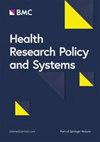Gender and non-communicable diseases in Mexico: a political mapping and stakeholder analysis
IF 3.6
2区 医学
Q1 HEALTH POLICY & SERVICES
引用次数: 0
Abstract
Mexico and other low- and middle-income countries (LMICs) present a growing burden of non-communicable diseases (NCDs), with gender-differentiated risk factors and access to prevention, diagnosis and care. However, the political agenda in LMICs as it relates to health and gender is primarily focused on sexual and reproductive health rights and preventing violence against women. This research article analyses public policies related to gender and NCDs, identifying political challenges in the current response to women’s health needs, and opportunities to promote interventions that recognize the role of gender in NCDs and NCD care in Mexico. We carried out a political mapping and stakeholder analysis during July–October of 2022, based on structured desk research and interviews with eighteen key stakeholders related to healthcare, gender and NCDs in Mexico. We used the PolicyMaker V5 software to identify obstacles and opportunities to promote interventions that recognize the role of gender in NCDs and NCD care, from the perspective of the political stakeholders interviewed. We found as a political obstacle that policies and stakeholders addressing NCDs do not take a gender perspective, while policies and stakeholders addressing gender equality do not adequately consider NCDs. The gendered social and economic aspects of the NCD burden are not widely understood, and the multi-sectoral approach needed to address these aspects is lacking. Economic obstacles show that budget cuts exacerbated by the pandemic are a significant obstacle to social protection mechanisms to support those caring for people living with NCDs. Moving towards an effective, equity-promoting health and social protection system requires the government to adopt an intersectoral, gender-based approach to the prevention and control of NCDs and the burden of NCD care. Despite significant resource constraints, policy innovation may be possible given the willingness among some stakeholders to collaborate, particularly in the labour and legal sectors. However, care will be needed to ensure the implementation of new policies has a positive impact on both gender equity and health outcomes. Research on successful approaches in other contexts can help to identify relevant learnings for Mexico.墨西哥的性别与非传染性疾病:政治图谱和利益攸关方分析
墨西哥和其他低收入和中等收入国家(LMICs)的非传染性疾病(NCDs)负担日益加重,其风险因素和获得预防、诊断和护理的机会存在性别差异。然而,低收入和中等收入国家与健康和性别有关的政治议程主要集中在性健康和生殖健康权利以及防止暴力侵害妇女方面。这篇研究文章分析了与性别和非传染性疾病相关的公共政策,指出了当前在满足妇女健康需求方面所面临的政治挑战,以及在墨西哥促进认识到性别在非传染性疾病和非传染性疾病护理中的作用的干预措施的机遇。2022 年 7 月至 10 月期间,我们在结构化案头研究和对墨西哥 18 个与医疗保健、性别和非传染性疾病相关的主要利益相关者进行访谈的基础上,进行了政治绘图和利益相关者分析。我们使用 PolicyMaker V5 软件,从受访政治利益相关者的角度出发,确定了促进认识到性别在非传染性疾病和非传染性疾病护理中的作用的干预措施的障碍和机遇。我们发现,作为一种政治障碍,应对非传染性疾病的政策和利益相关者没有采取性别视角,而应对性别平等的政策和利益相关者没有充分考虑非传染性疾病。非传染性疾病负担所涉及的社会和经济方面的性别问题没有得到广泛理解,也缺乏解决这些问题所需的多部门方法。经济障碍表明,因大流行病而加剧的预算削减是社会保护机制支持那些照顾非传染性疾病患者的人的重大障碍。要迈向一个有效的、促进公平的健康和社会保护体系,政府就必须采取跨部门、基于性别的方法来预防和控制非传染性疾病以及减轻非传染性疾病护理负担。尽管存在严重的资源限制,但由于一些利益相关者愿意合作,特别是在劳动和法律部门,政策创新还是有可能实现的。但是,需要注意确保新政策的实施对性别平等和健康结果都产生积极影响。对其他情况下的成功方法进行研究,有助于确定墨西哥的相关经验教训。
本文章由计算机程序翻译,如有差异,请以英文原文为准。
求助全文
约1分钟内获得全文
求助全文
来源期刊

Health Research Policy and Systems
HEALTH POLICY & SERVICES-
CiteScore
7.50
自引率
7.50%
发文量
124
审稿时长
27 weeks
期刊介绍:
Health Research Policy and Systems is an Open Access, peer-reviewed, online journal that aims to provide a platform for the global research community to share their views, findings, insights and successes. Health Research Policy and Systems considers manuscripts that investigate the role of evidence-based health policy and health research systems in ensuring the efficient utilization and application of knowledge to improve health and health equity, especially in developing countries. Research is the foundation for improvements in public health. The problem is that people involved in different areas of research, together with managers and administrators in charge of research entities, do not communicate sufficiently with each other.
 求助内容:
求助内容: 应助结果提醒方式:
应助结果提醒方式:


